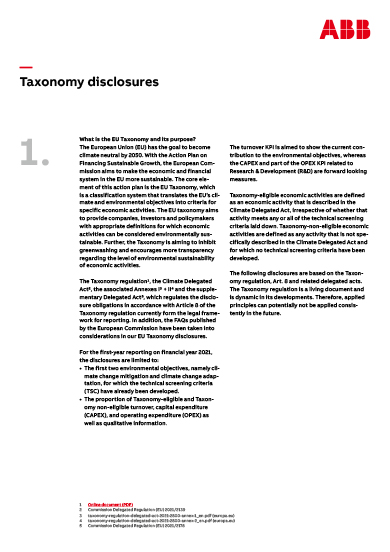EU taxonomy ABB’s position on the EU taxonomy
As a global technology company with sustainability at the center of its Purpose and value proposition, ABB welcomes the European Union’s introduction of a common classification system for sustainable economic activities, known as the “EU taxonomy”
The goal of the EU taxonomy is to create a clear definition of what is “sustainable” in order to drive investment in economic activities that contribute to the EU’s climate and energy targets and that support the European Green Deal. By clearly listing which activities and technologies are sustainable, the EU taxonomy should also help to limit “greenwashing” and make companies more climate-conscious.
How ABB adopted the EU taxonomy
To assess the extent to which ABB’s activities are reflected in the EU taxonomy, we conducted a thorough analysis, supported by a third party, of our products, sites and activities around the world and reviewed them against the economic activities defined by the taxonomy. Based on this analysis, we determined that most of our products and services are classified as “enabling activities.”
When we further broke down our activities to the level of granularity required to meet the EU taxonomy’s definitions, we found that 36 percent of our revenue (turnover) in 2021 was eligible under the objective of “climate change mitigation” (see chart below for the results of our assessment on the eligibility of our offerings according to revenues, capex and opex).
Results of ABB’s assessment of the eligibility of our offerings in the EU taxonomy:
Relevance of ABB’s activities in the EU taxonomy and critical technologies absent from the taxonomy
In our view, the EU taxonomy as it stands significantly underestimates the contribution that our products, solutions and services make in reducing our customers’ carbon footprints and in aligning their activities with the EU taxonomy. In particular, the alignment criteria do not address many associated activities that will be important in decarbonizing the energy system.
The EU taxonomy would need to take account of all economic activities that play an important role in the transition towards net zero. Currently, the taxonomy focuses on sectors that are directly responsible for greenhouse gas emissions, but takes no account of many critical technologies, such as electrical equipment or industrial automation, that are needed to enable a renewable energy system.
The EU taxonomy also does not consider the management of electricity consumption, which could be substantially reduced in a short time frame through the deployment of readily available and cost-effective technologies. For example, upgrading an electric motor to a higher energy standard can deliver significant energy savings that recoup the cost of the motor in lower energy bills. The same applies to industrial automation, which in the process industries can deliver energy savings of up to 25 percent.1
If ABB were to extend the eligibility analysis to cover such activities, we estimate that a further 31 percent of ABB’s revenue could be attributed to solutions that are indirect enablers of climate change mitigation. The results could then be interpreted according to the chart below.
Results of ABB’s portfolio analysis of the EU taxonomy including carbon emissions reduction-enabling activities:
Recommendations and way forward
In summary, we see the EU taxonomy as a significant step forward in developing a common classification system for sustainable economic activities. However, it needs to be expanded to include activities and sectors that contribute indirectly, but still significantly, to a low-carbon society – something that the EU acknowledges. ABB recommends and is ready to support greater private-sector involvement in determining which activities and sectors should be covered.
Climate change is a global challenge that requires a global approach. The end goal should be a common global classification system for sustainable activities that is comprehensive, credible and relevant to the entire world. If the gaps and shortcomings in the EU taxonomy are addressed, we believe that it has the potential to serve as a model for such a system as well as an important driver of investment in sustainable development.
The detailed EU taxonomy disclosure document is available for download here.
